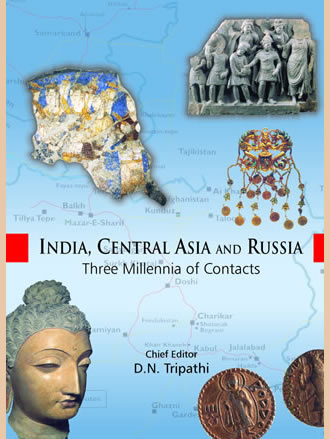INDIA, CENTRAL ASIA AND RUSSIA: Three Millennia of Contacts
INDIA, CENTRAL ASIA AND RUSSIA: Three Millennia of Contacts is backordered and will ship as soon as it is back in stock.
Couldn't load pickup availability
Genuine Products Guarantee
Genuine Products Guarantee
We guarantee 100% genuine products, and if proven otherwise, we will compensate you with 10 times the product's cost.
Delivery and Shipping
Delivery and Shipping
Products are generally ready for dispatch within 1 day and typically reach you in 3 to 5 days.
- Total Pages: xxxviii + 332
- Format: HB (Hardback)
- ISBN: 9788173052941
- Edition: 1st
- Publisher: Aryan Books International
- Book Size: 19 cm x 25 cm
- Year of Publication: 2013
India and Central Asia had close contacts in various fields of human activities from the earliest times. Archaeological excavations of stone and bronze cultures in Central Asia have brought to light a similarity with cultures existing in northwest India of the same time. There are striking similarities between the finds from Altyntepe in southern Turkmenistan and the relics of Harappan Culture in northwest India. More concrete historical evidence can he found during Kushana period. These relations became closer in the medieval times because the founders of the Delhi Sultanate and the Mughal Empire in the 13th and 16th centuries respectively hailed from Central Asian lands. Along with conquerors and founders of the ruling dynasties came the scholars, poets, scientists and Sufi saints. Religious influence spreading from one direction to the other set in motion a process of reciprocal cultural enrichment. There was also unhindered overland trade carried by merchant caravans. Like Indo-Central Asian relations, Indo-Russian relations also go back to remote past. There have been deep and abiding links because of geopolitical and strategic considerations. However, Central Asia has been continuously a vital link in relations between India and Russia. The present volume aims to trace these contacts and gives an overview of the origin, historical development, present state of relationship and future challenges. India, Central Asia, and Russia represent a certain harmony of originally distant and distinct cultures and civilizations finding a certain post-ideological affinity based on geography, historical links and common technological and economic challenges. The core of this conceptual agreement and its policy consequences is in pluralism, secularism, multi-ethnicity and cultural synthesis.





